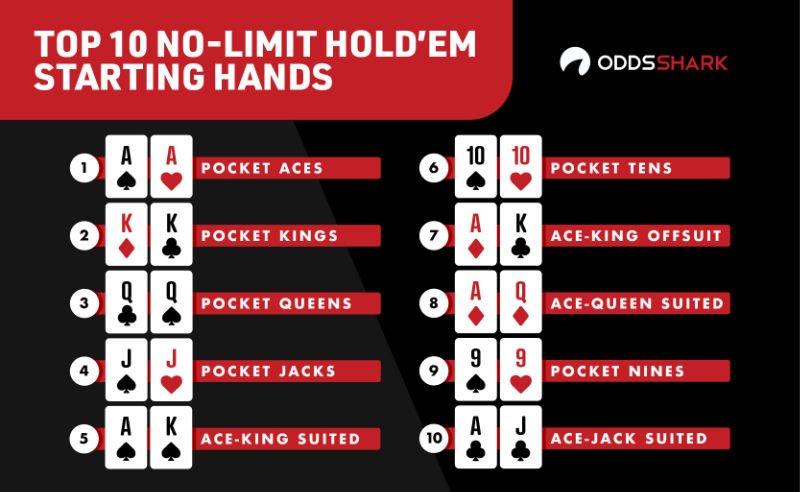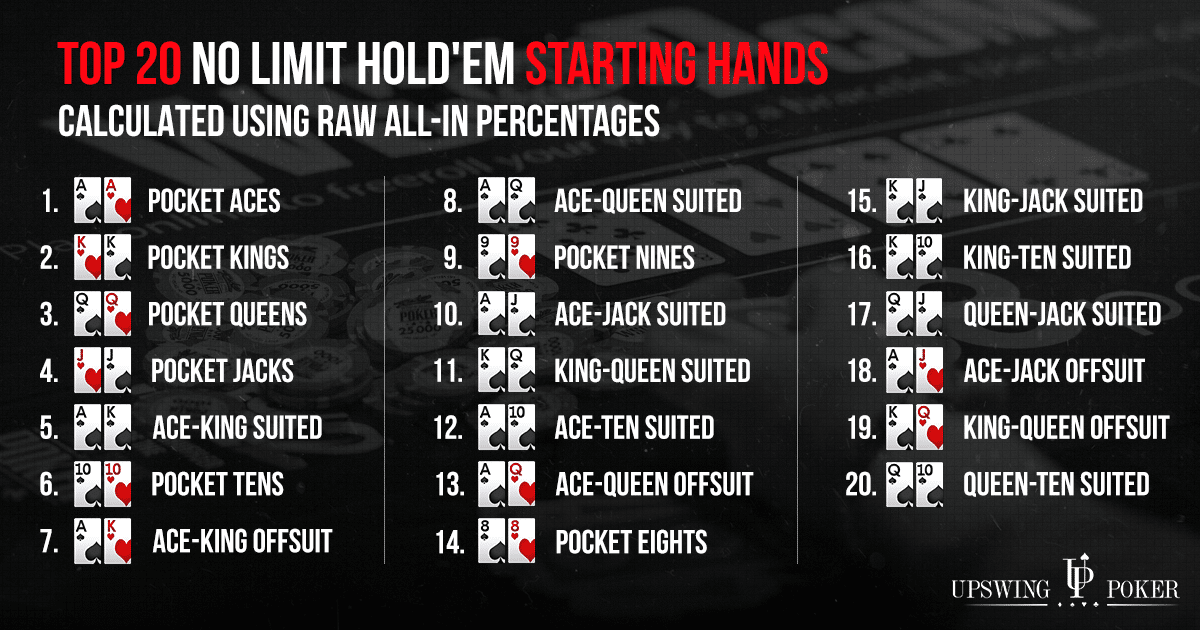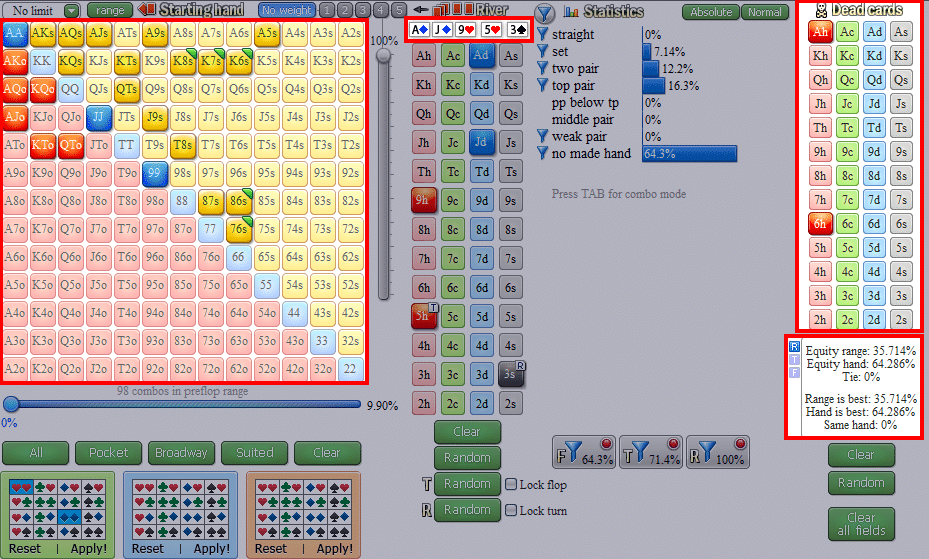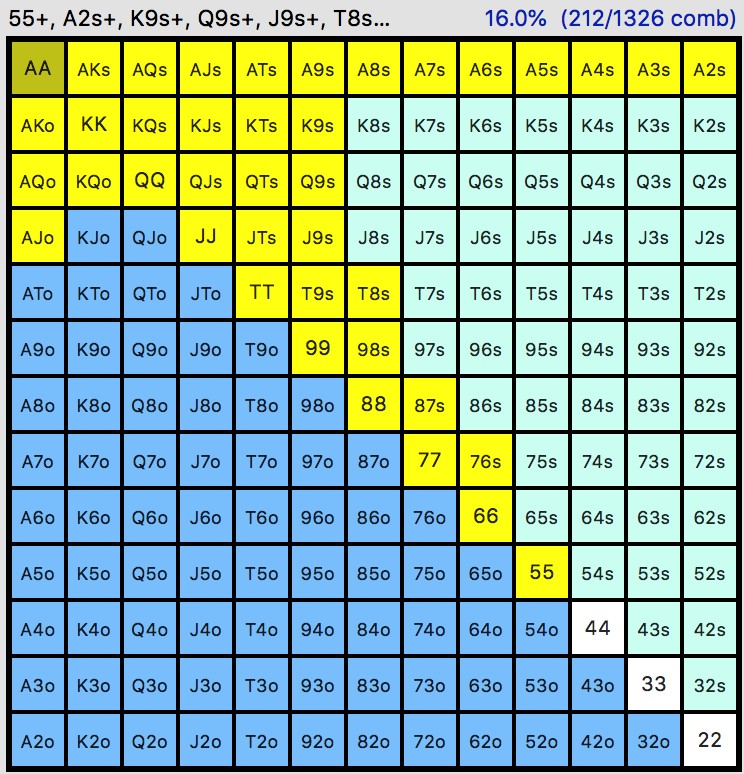In short, your decisions in the pre-flop betting round should be based on three key factors:
Success in Texas Hold’em starts with good preflop hand selection. If you’re playing a winning strategy, you’ll be folding preflop more than 70 percent of the time. It’s critical to have a solid understanding of poker hand rankings, what hands are worth playing, and how those hands change based on your position at the table. This is why the best preflop poker strategy in the world most of the time is simply to fold preflop! But when you have a decent hand and you see these weak plays out of others (limping, calling, playing a lot of hands) it is always advisable to isolate these players. This will be your bread and butter at the micros. On this site you can find all possible combinations of preflop hands that can occur in Texas Hold'em Poker. As a bonus you will also learn the nicknames of the different hands. The hands are ranked from #1 to #169, where #1 is the best. This ranking is applicable when the poker table is full ring (9-10 people).
How Strong Is My Preflop Hands in Texas Hold'em? Learning how to assess the preflop hand strength is crucial to hand ranking in Texas Holde'm. Find out the best hands to play from every table position. The absolutely best hand in pokeris the Royal Flush, which is made of Ace, King, Queen, Jack, and Ten, and all of those must be the same suit. For Example, Ah Kh Qh Jh Th would make a Royal Flush hand and is unbeatable by any other combination.

- Your hand strength
- Your position at the table
- Your opponents’ action in front of you

We now look more deeply at how to apply these basics in the specific environment of the cash-game tables.
Hand selection
As in all games of Texas Hold’em, be it tournament play or a cash game, you will need to categorise your starting hand. (Refresh your memory of what we mean by “monsters”, “very strong hands”, “speculative hands” and “trash” in the Poker Basics lesson.)
By and large, it is correct to raise with monsters and very strong hands; it is better to be more circumspect with speculative hands; and trash should be thrown away. As you get more experienced you will add other factors, but the core decision is based primarily on that list.
However in a cash game, you will have a bigger stack compared with the big blind, so you can tend to play more speculative hands. The reasons for this are twofold: firstly we are risking a much smaller proportion of our stack to enter a pot pre-flop. Secondly, if we hit, we will win a far bigger pot.
Therefore the risk/reward calculation changes with 100 BB stacks in a cash game. In some instances we should be happy to call pre-flop with a hand that we might ordinarily throw away. (The notion of “pot odds” is discussed in more depth later.) You can afford to call and miss with speculative hands like smaller pocket pairs and suited connectors against raises, knowing that you will fold if you miss.
The larger stack sizes also free you up to play slightly unorthodox poker at times. You might want to call with a very strong hand instead of re-raising. Or you might want to call a re-raise with a weaker speculative hand.
Your decision will need to take into account the effective stack size, as discussed in the last lesson.
For example: You are on the button with 3♣3♠ and a very tight player raises from early position. It is very likely that he holds a big pocket pair, so you will need to hit a set to win.
If your assumption is correct and the tight player has a big pair like A♥A♦ or K♠K♣ it will be tough for him to get away from his hand on a flop like 3♦Q♦10♠. You are very likely to be able to get the maximum amount of chips in the pot.
Therefore if the effective stack is 100 BB in this situation, you can certainly call the raise and hope to hit your set. The times you hit and win a big pot will make up for the times you miss and lose.
But if the effective stack is only 20 BB, you cannot win enough. Your relatively small profit will not make up for the times you miss. You should fold 3♣3♠ if you or your opponent is short-stacked.
In later stages of tournaments, play like this this simply doesn’t work. You usually play with a shallow stack, where fancy moves can cost you your tournament life. That is not true in a cash game, where the small investment pre-flop can grow into a big one if you hit the right flop.
But always keep in mind that stack size is not the only factor in the decision whether you want to play a hand or not – always consider position, opponents and your table image.

Join us on our Discord channel.
In short, your decisions in the pre-flop betting round should be based on three key factors:
- Your hand strength
- Your position at the table
- Your opponents’ action in front of you
Best Preflop Hands Texas Holdem
We now look more deeply at how to apply these basics in the specific environment of the cash-game tables.
Hand selection
As in all games of Texas Hold’em, be it tournament play or a cash game, you will need to categorise your starting hand. (Refresh your memory of what we mean by “monsters”, “very strong hands”, “speculative hands” and “trash” in the Poker Basics lesson.)
By and large, it is correct to raise with monsters and very strong hands; it is better to be more circumspect with speculative hands; and trash should be thrown away. As you get more experienced you will add other factors, but the core decision is based primarily on that list.
Best Poker Hands Preflop
However in a cash game, you will have a bigger stack compared with the big blind, so you can tend to play more speculative hands. The reasons for this are twofold: firstly we are risking a much smaller proportion of our stack to enter a pot pre-flop. Secondly, if we hit, we will win a far bigger pot.
Therefore the risk/reward calculation changes with 100 BB stacks in a cash game. In some instances we should be happy to call pre-flop with a hand that we might ordinarily throw away. (The notion of “pot odds” is discussed in more depth later.) You can afford to call and miss with speculative hands like smaller pocket pairs and suited connectors against raises, knowing that you will fold if you miss.
The larger stack sizes also free you up to play slightly unorthodox poker at times. You might want to call with a very strong hand instead of re-raising. Or you might want to call a re-raise with a weaker speculative hand.
Your decision will need to take into account the effective stack size, as discussed in the last lesson.
For example: You are on the button with 3♣3♠ and a very tight player raises from early position. It is very likely that he holds a big pocket pair, so you will need to hit a set to win.
If your assumption is correct and the tight player has a big pair like A♥A♦ or K♠K♣ it will be tough for him to get away from his hand on a flop like 3♦Q♦10♠. You are very likely to be able to get the maximum amount of chips in the pot.
Therefore if the effective stack is 100 BB in this situation, you can certainly call the raise and hope to hit your set. The times you hit and win a big pot will make up for the times you miss and lose.

But if the effective stack is only 20 BB, you cannot win enough. Your relatively small profit will not make up for the times you miss. You should fold 3♣3♠ if you or your opponent is short-stacked.
In later stages of tournaments, play like this this simply doesn’t work. You usually play with a shallow stack, where fancy moves can cost you your tournament life. That is not true in a cash game, where the small investment pre-flop can grow into a big one if you hit the right flop.

But always keep in mind that stack size is not the only factor in the decision whether you want to play a hand or not – always consider position, opponents and your table image.
Join us on our Discord channel.